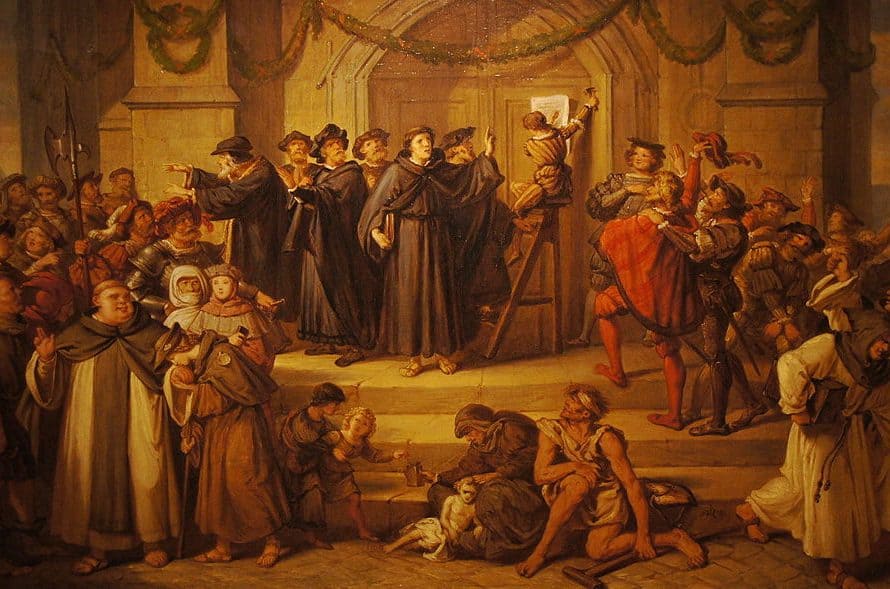WITTENBERG, Germany – In 1505, the young man Martin Luther, cowering before a thunderbolt, vowed to become a monk and a devout servant of the Catholic church under the headship of the Roman pontiff. Fifteen years later, in the summer of 1520, Pope Leo X launched his own thunderbolt at Luther in the form of an edict that denounced Luther as a “wild boar” destroying God’s “vineyard,” the Catholic church. The pope warned Luther to recant his errors within 60 days, lest he be condemned as a heretic and turned over to secular authorities for punishment.
Why did Luther receive such a threat from the pope? On Oct, 31 1517, he posted 95 Theses that challenged the pope’s authority and criticized the church’s practice of raising income by guaranteeing people’s salvation at a price. But by the time Pope Leo X published his edict (called a “papal bull”), it had become clear that Luther’s dissent from the Roman church ran much deeper even than this.
Now, Luther didn’t cower beneath the thunderbolt of the pope’s edict. When he finally received the edict in the winter of 1520, he burned it alongside copies of Roman ecclesiastical law and books supporting the pope.
Meanwhile, he had begun to write a series of three classic works outlining the fundamental nature of his call for reform. These “Three Treatises,” as they are often called, were published 500 years ago this summer and fall.
“Southern Baptists would benefit immensely by familiarizing themselves with Luther’s three famous treatises of 1520, and the 500th anniversary of their publication is a perfect time to do so,” said Malcolm Yarnell, research professor of theology at Southwestern Baptist Theological Seminary in Fort Worth, Texas. “The three primary Reformation doctrines of sola scriptura (i.e., Scripture alone), the priesthood of all believers, and salvation by faith appear in them. In particular, Luther’s On Christian Liberty is one of the clearest statements of salvation by grace through personal faith in Jesus Christ ever written.”
Yarnell added that the modern principle of “religious liberty” is, in fact, “historically derived” from the doctrine of “Christian liberty” that Luther defends in his third treatise, On Christian Liberty.
“Luther had to fight his way against the entire medieval Roman apparatus with its domineering theological worldview in order to get back to the scriptural understanding of Christianity,” Yarnell said. “While doing so, he regained the priority of the individual’s relationship with God. It is only as the human conscience is personally persuaded that he or she comes to faith. Faith cannot be imposed by priestly abuse or compelled by royal coercion. Faith comes by hearing the Word of God.”
In On Christian Liberty, Luther said that, for spiritual health, life and righteousness, Christians need nothing but the Word of God—that is, in this instance, the gospel of Jesus Christ. And nothing can grasp the Word of God except faith alone. Good works cannot help people spiritually, nor can physical affliction harm them spiritually. In contrast, faith in the gospel brings righteousness apart from works, and faith alone honors God’s promise of salvation through Christ’s death.
By faith, Luther writes, Christians are united “with Christ as a bride is united with her bridegroom.” Just as husband and wife share all things, even so Christ takes ownership of everything that belongs to the believer—including their “sins, death and damnation.” Likewise, by faith, the Christian receives from Christ everything that belongs to Him—including life, salvation and righteousness.
Because Christians are united with Christ in faith, moreover, each of them is “a perfectly free lord of all, subject to none.” They are completely free from slavery under sin or the law, and all things “work together” – as the apostle Paul writes in Romans 8 – to bring about life, peace and salvation for them. At the same time, by faith in Christ, they are “priests,” graciously empowered to approach God’s throne and to pray for and teach one another. Such is the Christian liberty that Christians receive only by faith, and this faith cannot be coerced by any human being.
However, Luther also says that each Christian is a “perfectly dutiful servant of all, subject to all.” They don’t serve anyone to earn their way to heaven. Instead, they serve their neighbors out of Christian love.
“We conclude, therefore, that a Christian lives not in himself, but in Christ and his neighbor. Otherwise he is not a Christian,” Luther writes. “He lives in Christ through faith, in his neighbor through love. By faith he is caught up beyond himself into God. By love he descends beneath himself into his neighbor.”

